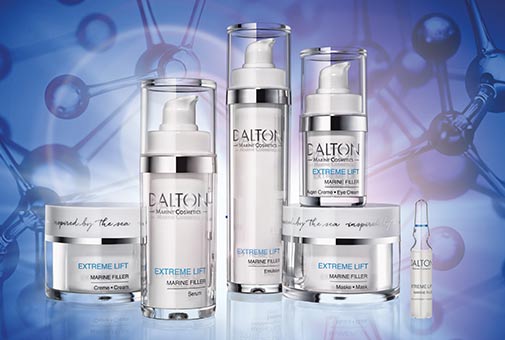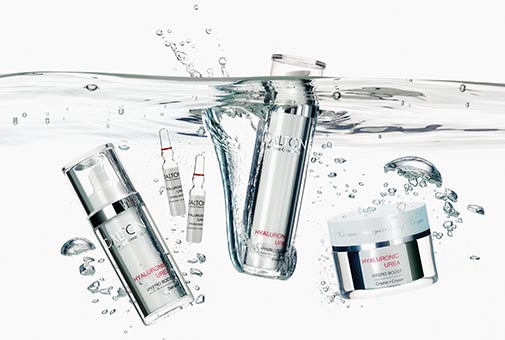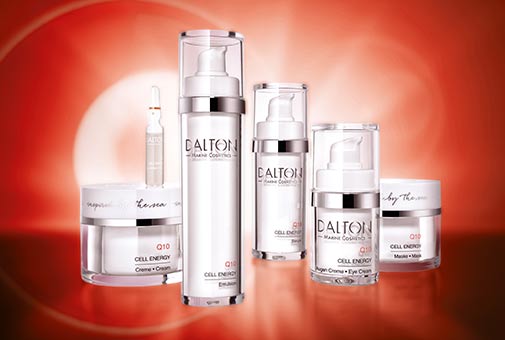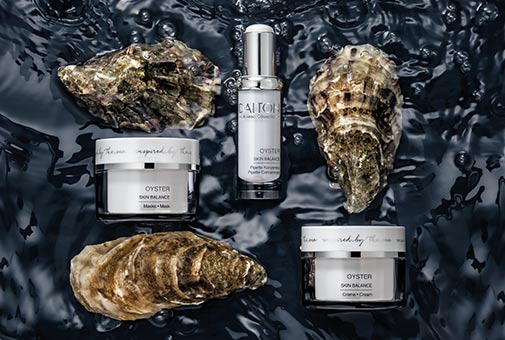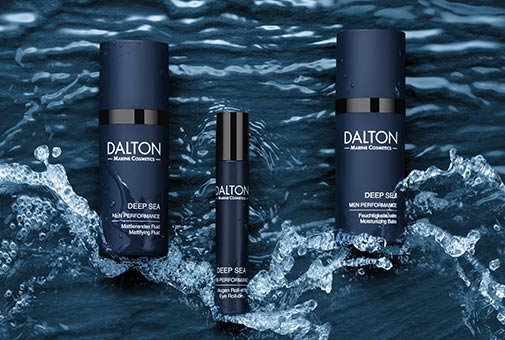
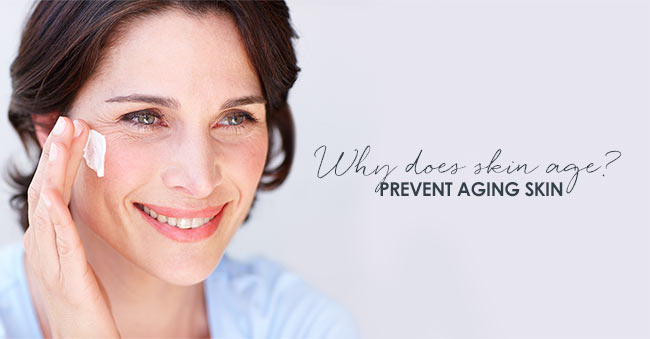
Prevent aging skin: Why does skin age?
The natural aging process of the skin can start from the age of 21 and the first visible signs of aging usually begin to become apparent around the age of 30 – whether you want them to or not. How fast your skin ages is determined by a combination of genetics, personal lifestyle and environmental factors like sun exposure. A healthy lifestyle and consistent sun protection can be quite effective at preventing premature skin aging, however.
How does aging affect the skin?
As we get older, our cell metabolism slows down and skin cells take longer to regenerate. Keratinized cells remain in the stratum corneum for longer, exposed to environmental influences. The natural cell renewal process can now take up to 40 days instead of 28 days. Furthermore, we produce less collagen as we age, which causes the skin to become thinner and less elastic over time.
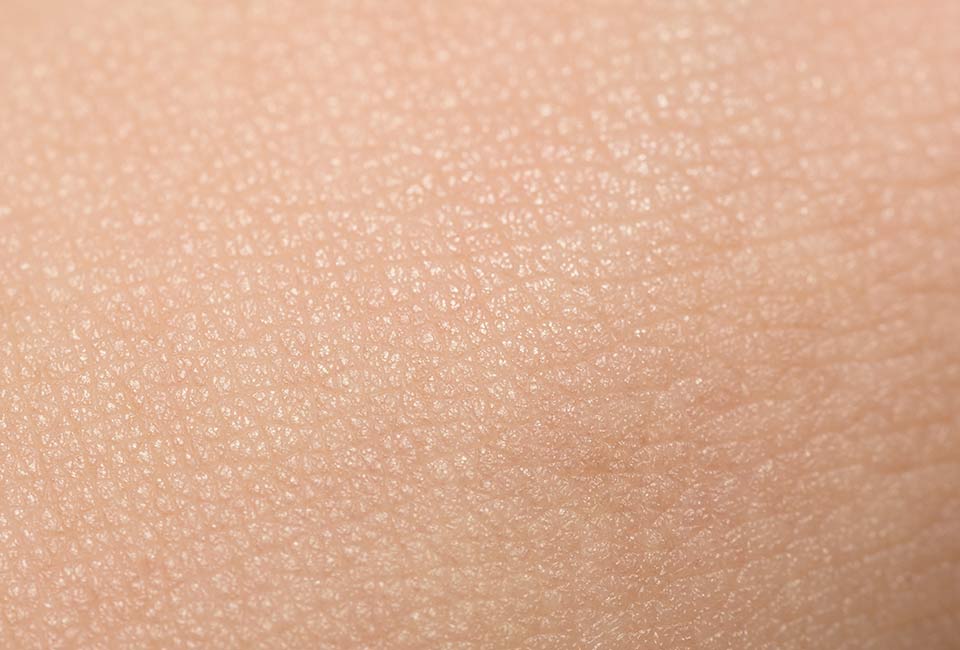

EPIDERMIS
The cell renewal process and cell regeneration in the epidermis (the outermost layer of human skin) slows down as we age. As a result, the epidermis becomes thinner and drier and takes longer to heal when injured.
DERMIS
The dermis is anchored to the epidermis and replenishes it with vital nutrients. It is also responsible for the formation of collagen fibers, which give the skin its stability and elasticity.
SUBCUTIS
The subcutis (subcutaneous tissue or hypodermis) consists of connective tissue and fat cell chambers filled with adipose cells. It is closely connected to the dermis and helps the skin to bind water and regulate the skin’s moisture levels. The ability to bind water diminishes as we age.
EPIDERMIS
The cell renewal process and cell regeneration in the epidermis (the outermost layer of human skin) slows down as we age. As a result, the epidermis becomes thinner and drier and takes longer to heal when injured.
DERMIS
The dermis is anchored to the epidermis and replenishes it with vital nutrients. It is also responsible for the formation of collagen fibers, which give the skin its stability and elasticity.
SUBCUTIS
The subcutis (subcutaneous tissue or hypodermis) consists of connective tissue and fat cell chambers filled with adipose cells. It is closely connected to the dermis and helps the skin to bind water and regulate the skin’s moisture levels. The ability to bind water diminishes as we age.
What causes premature skin aging
While the skin aging process is different for everyone, there are various factors to consider if you want to prevent aging skin. However, the main causes of skin aging are sun exposure and genetic predisposition.


Sun exposure
Up to 80% of visible skin aging is due to UV radiation and sun damage. UVA rays, in particular, can damage the collagen fibers in our skin, which causes the skin to lose elasticity and age prematurely. Exposure to UV rays can also cause wrinkles and age spots. That is why it is important to practice sun protection at all times – because while your tan will disappear, you can’t really undo the damage caused by sun exposure.
Neglecting skincare or using wrong products
Neglecting skincare or using the wrong skincare products can lead to premature signs of skin aging. It is important to take care of your skin with well-balanced products that work for your skin type. Face creams and lotions hydrate and provide the skin with anti-aging ingredients that help to prevent and reduce visible signs of aging.
Nicotine
Smoking compromises blood flow and inhibits the cell renewal process. Furthermore, cigarette smoking produces large amounts of free radicals, which lead to oxidative stress and premature skin aging.
Genetics & the natural aging process
Young skin produces plenty of hyaluronic acid and collagen on its own, but production slows down as we get older, and the skin loses volume, elasticity and firmness. Eventually, this will lead to wrinkles. Dry skin develops wrinkles even earlier than other skin types. You can, however, slow the natural signs of aging by combining a healthy lifestyle with the right skincare.
Sun exposure
Up to 80% of visible skin aging is due to UV radiation and sun damage. UVA rays, in particular, can damage the collagen fibers in our skin, which causes the skin to lose elasticity and age prematurely. Exposure to UV rays can also cause wrinkles and age spots. That is why it is important to practice sun protection at all times – because while your tan will disappear, you can’t really undo the damage caused by sun exposure.
Neglecting skincare or using wrong products
Neglecting skincare or using the wrong skincare products can lead to premature signs of skin aging. It is important to take care of your skin with well-balanced products that work for your skin type. Face creams and lotions hydrate and provide the skin with anti-aging ingredients that help to prevent and reduce visible signs of aging.
Nicotine
Smoking compromises blood flow and inhibits the cell renewal process. Furthermore, cigarette smoking produces large amounts of free radicals, which lead to oxidative stress and premature skin aging.
Genetics & the natural aging process
Young skin produces plenty of hyaluronic acid and collagen on its own, but production slows down as we get older, and the skin loses volume, elasticity and firmness. Eventually, this will lead to wrinkles. Dry skin develops wrinkles even earlier than other skin types. You can, however, slow the natural signs of aging by combining a healthy lifestyle with the right skincare.
Characteristics of aging skin
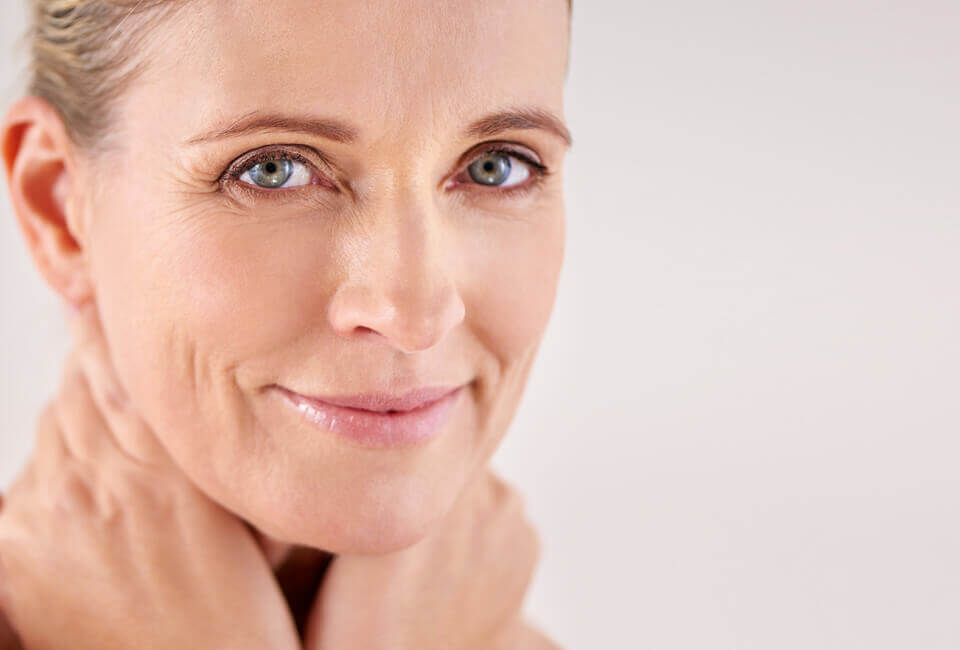

Dull, tired complexion
During and after menopause, capillary blood flow decreases, the skin becomes thinner and appears dull and pale.
Fine lines and wrinkles
We need facial expressions to convey feelings and emotions, but they are also responsible for the formation of fine lines and wrinkles. In the sensitive eye area, signs of aging show in the form of crow’s feet or frown lines between the brows. The nasolabial folds between mouth and nose become deeper and more visible. Fine wrinkles appear on the forehead and in the area of neck and décolleté.
Hyperpigmentation
UV radiation and excess melanin production lead to an accumulation of lipofuscin, the pigment responsible for age spots on the skin. As we age, the mechanisms that clear out waste products break down, the pigments build up and permanent brown spots (so-called ‘age spots‘) appear.
Age-related skin dryness
Between the ages of 20 and 30, our cell metabolism begins to slow down and the skin loses its elasticity. On top of that, our sebum glands produce less oil and the skin gradually loses its ability to bind water, which leads to dryness and fine lines and wrinkles.
Decreased collagen production
Collagen plays an important role in skin aging, because it is a major component of the connective tissue and gives the skin its strength and youthful appearance. However, collagen production begins to decline in our 20s and 30s and continues to decrease as we age, resulting in loss of skin elasticity, deep wrinkles and sagging skin.
Dull, tired complexion
During and after menopause, capillary blood flow decreases, the skin becomes thinner and appears dull and pale.
Fine lines and wrinkles
We need facial expressions to convey feelings and emotions, but they are also responsible for the formation of fine lines and wrinkles. In the sensitive eye area, signs of aging show in the form of crow’s feet or frown lines between the brows. The nasolabial folds between mouth and nose become deeper and more visible. Fine wrinkles appear on the forehead and in the area of neck and décolleté.
Hyperpigmentation
UV radiation and excess melanin production lead to an accumulation of lipofuscin, the pigment responsible for age spots on the skin. As we age, the mechanisms that clear out waste products break down, the pigments build up and permanent brown spots (so-called ‘age spots‘) appear.
Age-related skin dryness
Between the ages of 20 and 30, our cell metabolism begins to slow down and the skin loses its elasticity. On top of that, our sebum glands produce less oil and the skin gradually loses its ability to bind water, which leads to dryness and fine lines and wrinkles.
Decreased collagen production
Collagen plays an important role in skin aging, because it is a major component of the connective tissue and gives the skin its strength and youthful appearance. However, collagen production begins to decline in our 20s and 30s and continues to decrease as we age, resulting in loss of skin elasticity, deep wrinkles and sagging skin.
Tips to prevent skin aging
Nothing can stop the natural aging process, but you can do certain things to slow it down. Above all, you can protect your skin from environmental damage and stress:
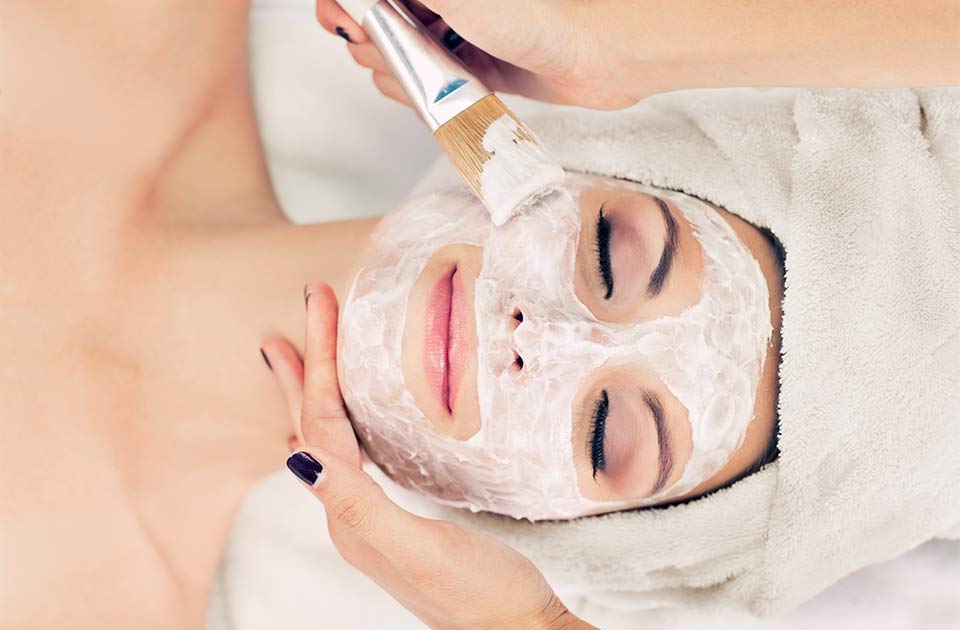

Sun protection
To prevent premature skin aging, it is essential to understand the importance of daily sun protection and avoid excessive sun exposure and tanning beds. Even with sunscreen, dermatologists recommend to avoid exposure to the midday sun or wear a broad-brimmed hat and sun-protective clothing. And remember – you can still get a tan even when you are in the shade.
Healthy diet
Eating a healthy and balanced diet is the key to beautiful, healthy skin. Antioxidant-rich foods that fight free radicals are especially helpful for preventing aging skin. Antioxidants are most abundant in certain fruits and vegetables, fish and wholegrains. Vitamins, minerals and trace elements also help to keep your body and skin healthy and fight the signs of aging. And always remember to drink plenty of water!
Quit smoking
Smoking narrows the blood vessels, which inhibits blood flow and decreases the amount of oxygen and nutrients your skin receives. This leads to premature signs of aging and wrinkles.
Regular exercise
Regular physical activity keeps your body in shape, improves circulation, increases blood flow and helps to reduce stress. And it results in a rosy and radiant complexion!
Reduce stress
The best way to help your body regenerate is by getting enough sleep and reducing stress. Stress can play a big part in your skin’s overall health and appearance and may result in irritation and wrinkles.
Sun protection
To prevent premature skin aging, it is essential to understand the importance of daily sun protection and avoid excessive sun exposure and tanning beds. Even with sunscreen, dermatologists recommend to avoid exposure to the midday sun or wear a broad-brimmed hat and sun-protective clothing. And remember – you can still get a tan even when you are in the shade.
Healthy diet
Eating a healthy and balanced diet is the key to beautiful, healthy skin. Antioxidant-rich foods that fight free radicals are especially helpful for preventing aging skin. Antioxidants are most abundant in certain fruits and vegetables, fish and wholegrains. Vitamins, minerals and trace elements also help to keep your body and skin healthy and fight the signs of aging. And always remember to drink plenty of water!
Quit smoking
Smoking narrows the blood vessels, which inhibits blood flow and decreases the amount of oxygen and nutrients your skin receives. This leads to premature signs of aging and wrinkles.
Regular exercise
Regular physical activity keeps your body in shape, improves circulation, increases blood flow and helps to reduce stress. And it results in a rosy and radiant complexion!
Reduce stress
The best way to help your body regenerate is by getting enough sleep and reducing stress. Stress can play a big part in your skin’s overall health and appearance and may result in irritation and wrinkles.
The perfect skincare regimen to prevent skin aging
It is never too late to start skincare. But the earlier you start a regular routine, the better your skin will look as you get older. Anti-aging skincare products can be quite effective at slowing visible signs of skin aging. DALTON MARINE COSMETICS anti-aging products combine the Celumer Marine Extract with the most beneficial skincare ingredients to delay and reduce the visible signs of aging for younger-looking skin.

